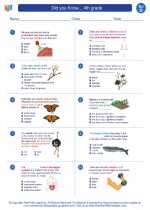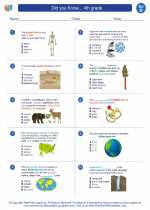Did you Know... 4th grade -> boiling
Boiling
Boiling is the process in which a liquid turns into vapor when it is heated to its boiling point. It occurs when the vapor pressure of the liquid equals the atmospheric pressure. The boiling point of a substance is the temperature at which it changes from a liquid to a gas. This process is an important part of the water cycle, as it is responsible for the formation of clouds and rain.
Factors Affecting Boiling
- Atmospheric Pressure: The boiling point of a liquid decreases with a decrease in atmospheric pressure and increases with an increase in atmospheric pressure.
- Type of Liquid: Different liquids have different boiling points. For example, water boils at 100°C (212°F) at sea level, while the boiling point of ethanol is 78.37°C (173.07°F) at sea level.
- Heating Source: The intensity of the heating source affects the rate at which a liquid boils.
Study Guide
To study the concept of boiling effectively, follow these steps:
- Understand the definition of boiling.
- Learn about the factors that affect the boiling point of a liquid.
- Conduct experiments to observe the boiling process under different atmospheric pressures and with different liquids.
- Use a thermometer to measure the boiling points of various liquids.
- Explore the applications of boiling in everyday life, such as in cooking and the generation of steam for power plants.
By following this study guide, you can gain a comprehensive understanding of the concept of boiling and its practical implications.
[Boiling] Related Worksheets and Study Guides:
.◂Science Worksheets and Study Guides Fourth Grade. Did you Know... 4th grade
Study Guide Did you Know... 4th grade
Did you Know... 4th grade  Worksheet/Answer key
Worksheet/Answer key Did you Know... 4th grade
Did you Know... 4th grade  Worksheet/Answer key
Worksheet/Answer key Did you Know... 4th grade
Did you Know... 4th grade  Worksheet/Answer key
Worksheet/Answer key Did you Know... 4th grade
Did you Know... 4th grade 

 Worksheet/Answer key
Worksheet/Answer key
 Worksheet/Answer key
Worksheet/Answer key
 Worksheet/Answer key
Worksheet/Answer key

The resources above cover the following skills:
Core Ideas for Knowing Science
Life Science
Organisms are organized on a cellular basis and have a finite life span.